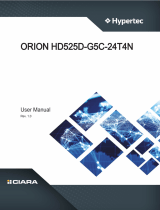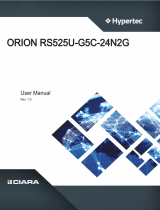
- 4 -
2-3 AMD CBS Menu ............................................................................................. 73
2-3-1 CPU Common Options ...........................................................................................74
2-3-2 DF Common Options ..............................................................................................79
2-3-3 UMC Common Options ..........................................................................................84
2-3-4 NBIO Common Options ..........................................................................................97
2-3-5 FCH Common Options .........................................................................................103
2-3-6 NTB Common Options .........................................................................................113
2-3-7 SOC Miscellaneous Control .................................................................................114
2-4 AMD PBS Menu ........................................................................................... 115
2-4-1 RAS ......................................................................................................................116
2-5 Chipset Setup Menu ..................................................................................... 118
2-5-1 North Bridge .........................................................................................................119
2-6 Server Management Menu ........................................................................... 120
2-6-1 System Event Log ................................................................................................122
2-6-2 View FRU Information ..........................................................................................123
2-6-3 BMCVLANConguration .....................................................................................124
2-6-4 BMCNetworkConguration .................................................................................125
2-7 Security Menu .............................................................................................. 126
2-7-1 Secure Boot .........................................................................................................127
2-8 Boot Menu .................................................................................................... 129
2-8-1 UEFI NETWORK Drive BBS Priorities ................................................................131
2-8-2 UEFI Application Boot Priorities ................................................................. 132
2-9 Save & Exit Menu ......................................................................................... 133
2-10 ABL POST Codes ........................................................................................ 134
2-10-1 StartProcessorTestPoints .....................................................................................134
2-10-2 Memory test points ...............................................................................................134
2-10-3 PMU Test Points ...................................................................................................134
2-10-4 Original Post Code ...............................................................................................135
2-10-5 CPU test points .....................................................................................................136
2-10-6 Topology test points ..............................................................................................136
2-10-7 Extended memory test point .................................................................................136
2-10-8 Gnb Earlier init ......................................................................................................137
2-10-9 PMU test points ....................................................................................................140
2-10-10 ABL0 test points ...................................................................................................140
2-10-11 ABL5 test points ...................................................................................................140
2-11 Agesa POST Codes ..................................................................................... 144
2-11-1 Universal Post Code .............................................................................................144
2-11-2 [0xA1XX] For CZ only memory Postcodes ...........................................................144
2-11-3 S3 Interface Post Code ........................................................................................147
2-11-4 PMU Post Code ....................................................................................................147
2-11-5 [0xA5XX] assigned for AGESA PSP Module ........................................................147























